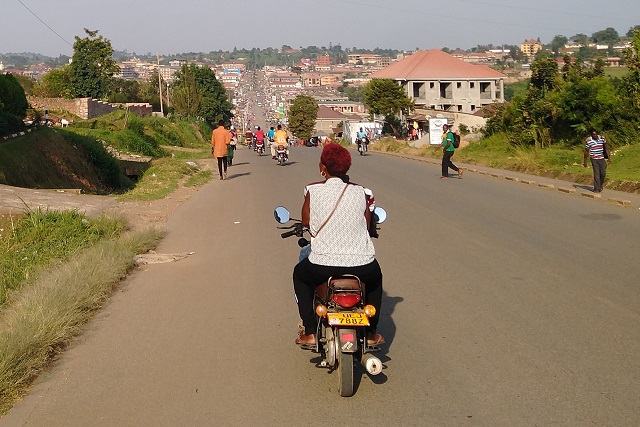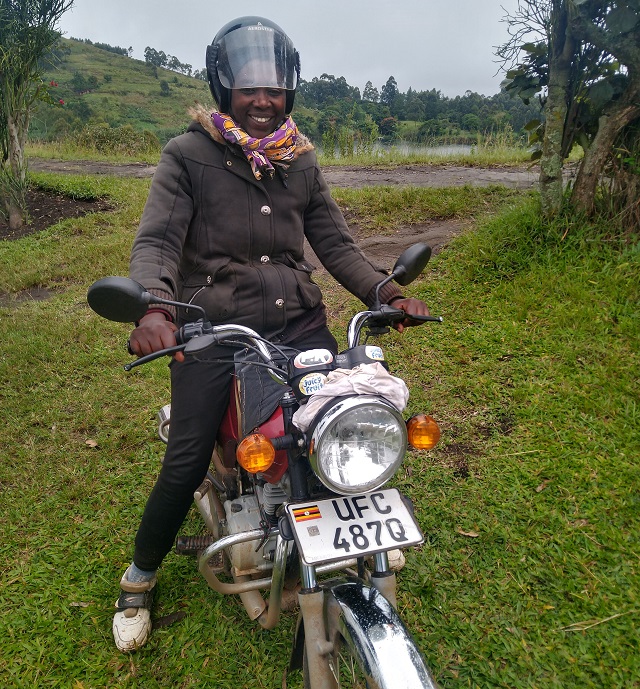
For men, women, and children, movement around and across Ugandan cities is dominated by minibuses, motorcycle taxis and walking. However, gender roles and differences in priorities and values mean women’s and men’s travel needs can differ widely. Recently, interviews conducted by WRI Africa in the city of Fort Portal, Uganda, revealed just how different these experiences can be.
While the three predominant modes of transportation – minibuses, motorcycle taxis and walking – offer very different kinds of services, each has significant barriers to equal access in the bustling, newly declared city.
Why Gender Matters
In Uganda, gender roles prescribe women as mothers and market sellers (amongst others) and make them primarily responsible for childcare and domestic duties. This means that women are particularly responsible for taking children to school and to the hospital, and when women go to work, they do not have the same luxury as men often do of leaving children at home. Men generally spend their days working or looking for work, necessitating different transportation patterns.
Preliminary data from a WRI survey conducted with the University of Michigan in the regional city of Fort Portal bears this out, showing that women accompany children on three times as many trips as men do. In interviews, men spoke about the burden of accompanying children while travelling. Some men said they take modes that are easier to control children on, like taxis and minibuses, while women reported taking children on up to five times as many walking trips as men. Women’s walking trips with children were also twice as long as men’s trips with children.
Taken together, these results points to a significant gap in needs for men and women. They also suggest that reforms that are beneficial to women will also benefit children. These include improved sidewalks and footpaths, street lighting, and reduced fares for children on public transportation.
Barriers to Inclusive Travel for Women
Even without being saddled with the task of child-corralling, women face significant dangers in traversing city streets and peri-urban paths from threats of theft, assault and sexual harassment. The effects of poor walkways and crime are felt by all pedestrians, but in Fort Portal, similar to low-income cities in neighboring Kenya, working women are more likely to walk to work than men.
Women’s travel habits in places like Fort Portal may also be influenced by historic injustices. In neighboring Bunyoro, women were required to have road passes issued by village chiefs in order to leave their villages as late as the 1950s. This was a result of the colonial introduction of a cash crop economy, which led to male agricultural workers focusing on crops that made money while domestic food production was left entirely for women. This combined with a fear of famine led to requirements for women to stay at home producing food. Today, though these laws are long gone, women in Fort Portal still take significantly fewer trips than men outside of the home, and a much greater proportion of these are walking trips.
An Uphill Ride in Motorbike Taxi Driving
The barriers and constraints facing women travelers are also pervasive for the rare women who work as boda boda motorbike taxi drivers, who are estimated to make up less than 1% of boda boda drivers across Uganda. Teddy Kabatoro, the vice chairperson of the Kabarole Women’s Boda Boda Rider and Farmer Association (KWBBRFA), described in interviews how she began driving when she was selling food on the street at night and her male colleagues encouraged her to take it up as a means of delivering food to clients. Male passengers initially avoided her, believing she was not strong enough to operate a motorbike. After a few months of nighttime driving, Kabatoro experienced an attempted robbery and changed to daytime driving.
Kabatoro now generally avoids picking up passengers from the roadside, instead relying on a list of clients with whom she has developed trust and who give her steady work. Though she paid to join the male-dominated Kabarole Boda Boda Association (KBBA) in order to work, she said that neither the KBBA nor city officials such as planners or engineers consult with the women’s group, the KWBBRFA. Interviews with the KBBA found there were pervasive rumors about the government giving women motorcycles for free, and many men expressed little desire to work together.
Among women drivers in the KWBBRFA, many were in fact without motorcycles, unwilling to take out the high-interest loans that many men take. According to interviews, the KWBBRFA has also encountered motorcycle owners who are unwilling to rent vehicles to women, as they claim women are more likely to be robbed. More information on the women boda boda drivers’ situation can be found in Moving in Growing Cities: Barriers to Accessibility in Fort Portal and Mbale.

Kabatoro’s story illuminates a range of factors shaping women’s mobility here. The first is that men often play a defining role in both entry to the transport industry and continued participation. Funding is also a critical issue in women’s entry into these businesses. Without vehicle owners willing to loan to female drivers or reasonable rates for motorcycle financing, joining the market remains difficult. We also see that women face a high risk of assault, throwing up obstacles to more women drivers and passengers. Finally, women’s associations are not always engaged with by either the male-dominated informal associations or government stakeholders, including physical planners and transportation engineers.
Finding Solutions
Fortunately, there are organizations actively working to make the urban transport landscape more accessible for women in East Africa. The Flone Initiative, for example, was established in 2011 to tackle gender-based discrimination and violence on public transportation in Kenya and has launched three projects. The Usalama wa Uma project has trained more than 700 public transport providers to intervene to prevent sexual harassment and violence across the Kenyan transport sector. Report It Stop It, also in Kenya, is a crowd-mapping platform that allows witnesses and victims to report incidents of harassment and assault, providing data to support improved government and civil society responses. Another project, in Uganda with UNFPA and SafeBoda, integrates gender-based violence prevention tactics – including education on sexual and reproductive health issues – into an entry training curriculum for new boda boda drivers.
Women’s experiences with transportation in Uganda are complex, and can shape women’s accessibility to jobs, medical care and their overall wellbeing. Approaching issues from both the passenger and operator perspectives can help policymakers, NGOs and community leaders better understand how to create a safer environment for women, children and all residents.
Thomas Courtright is an independent transportation researcher based in Dar es Salaam, Tanzania.
Emmerentian Mbabazi is Project Specialist for Cities at WRI Africa, based in Kampala.
Anna Oursler is Urban Mobility Project Coordinator for WRI Africa, based in Kampala.








